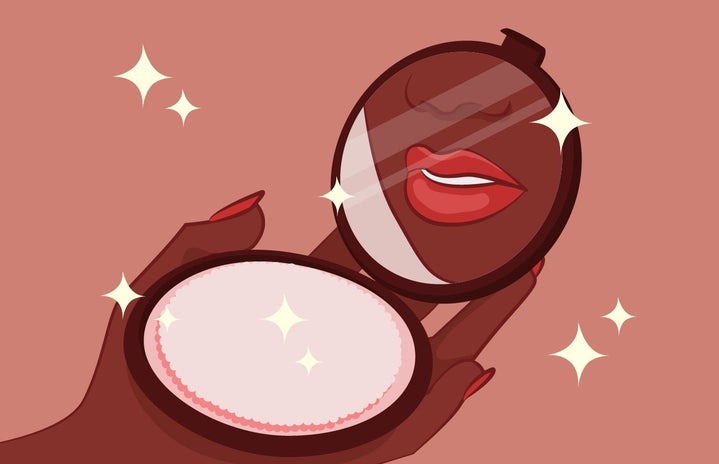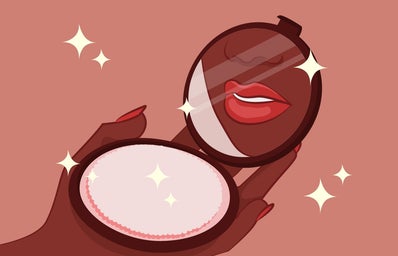As a kid, I loved stumbling around our house in my mom’s high heels. Her knee-high boots would reach the thighs of my eight-year old body, the leather would stick to my skin, and even then, I knew there was power in shoes that could turn heads and make an entrance.
This is the earliest memory I have of understanding what a woman should look like.
In the seventh grade, to make it easier for the administration to police girls’ shoulders and legs for existing, my public middle school adopted uniforms. I had always liked clothes, but it wasn’t until I was told I couldn’t control what I wore that I realized just how much. I spent hours scouring through my mom’s old drawers, looking for anything that would let me rebel against the dress code. Once, it was a lime green denim jacket. Another time, it was a big black belt that I wore over the midriff. Or, it was as simple as rolling up my skirt a couple inches. Some days, you got pulled out of class and shamed for pushing the rules too far. The days that you passed under the radar, though—those were the victories.
This is the earliest memory I have of understanding what a woman shouldn’t look like.
At age fourteen, my family moved. I was placed at a less competitive middle school to finish eighth grade. There, the kids had parents that didn’t hound on them. They could afford to be more than their grades. Girls wore makeup, and I grew self-conscious of the fact that I didn’t. It seemed like all of them intrinsically knew what it meant to be beautiful, that there had been a class no one told me about or a memo I had missed. I craved the perfection I perceived in those around me, desperately—but I didn’t know how to attain it.
This is the earliest memory I have of feeling like a fraud as a woman.
I started wearing makeup my junior year of high school. It started out as a practice pulled out just for special occasions, and then it was once a week, and then it was every day. I had grown up hating my appearance, so I became addicted to the feeling of liking what I looked like. I thrived off of any attention that came my way, and I credited it to how I had gotten better at painting my face. The compliments were never a reflection of who I was or what my natural features were; they were a confirmation that I had gotten good at convincing the world I was pretty like the rest of them and a push to keep the charade going.
Somewhere between then and now, wearing makeup lost its sense of fun. It is no longer able to guarantee that I’m going to feel good about myself on a given day. When I wake up every morning, the boundary between want and need is fuzzy because—what does it mean when your face is more recognizable to you with makeup than it is without it?
In college, the girls don’t wear makeup, and I’ve grown self-conscious of the fact that I do. I worry that the makeup I wear is a blanket statement of my insecurities, that it projects them to the world and prepares my body and brain for unsanctimonious judgement. I feel pressured to be ‘naturally’ pretty and incompetent for failing to live up to that expectation.
This is the way I’ve come to understand that there is no ‘right’ scheme of being a woman. We live in a double bind; there is no winning when the messages sent to us about where the end goal lies are confusing and contradictory. I don’t wear makeup, and I dress plainly, and I worry I look sloppy, young and naive, and not ‘put together’ enough. I do wear makeup, and I dress in skirts and heels, and I worry I look artificial, like a stereotype, and that I’m trying too hard. In such an oppressive system, everywhere you turn looks like failure.
Still, I don’t know how to navigate femininity. I am unsure of how to interact with my clothes, shoes, and makeup. They are appearance-maintaining frameworks capable of giving my body and personhood power, but they can take it away just as easily. I am constantly burdened with the weight of not knowing if I am subverting and reclaiming stereotypes or succumbing to them.
I’ve come to realize that the most I can do is take it one day at a time. If I’m struggling and need some extra power to get through the day, I’ll turn to my femininity and use my expression of it as a source of strength. In those moments, it is okay for me to use my appearance as a coping mechanism. Some days, I need a sense of control and liberation, and my womanhood is the only place I know where to find it.
Some days, though, I wake up and I can tell that my mind and body tire of the effort, of the ceaseless fixation on how I view myself and how others view me. In those moments, I’ll challenge myself to go without makeup and shoes and nice clothes, to walk through the world without my mask and super suit. Because it gets exhausting to be constantly protecting you from yourself. I need breaks, time and space to let my body be what it is without the extra adornments, and it’s important to force myself to take them.
My femininity doesn’t mean what it once did at age seven, age thirteen, or even age fifteen. But that’s okay. Whatever capacity that it takes and manifests into is going to be what’s right for me.



